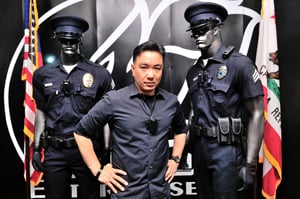When the Los Angeles Police Commission approved a $31 million contract for Taser International to provide body cameras to the Police Department last year, many smaller makers of body cameras saw it as a blow to their efforts to gain market share.
It wasn’t just that they lost a plum contract, however, it was the method the commission used to tap Taser. In a process known as “piggybacking,” the commission relied on the results of a competitive bidding process carried out by the much smaller Kern County Police Department to decide which body camera company would outfit their officers. The contract, finalized last month when the Los Angeles City Council approved the five-year deal with the Scottsdale, Ariz., company, stung at least one local body camera maker that has been making nominal inroads in the market dominated by Taser.
“When the city of Los Angeles builds bridges or roads it always goes through some bidding process to find the best quality for the best price,” said Peter Austin Onruang, founder of Wolfcom in Hollywood. “By not going to a bid, my company never had a chance. All I wanted was a chance, if not for myself at least for other small manufacturers out there. In the long run, this deal hurts everyone, small businesses like me and taxpayers like you.”
Of the 18,000 police departments in the United States, less than half use body cameras, according to Jim Bueermann, president of Washington, D.C., independent research firm Police Foundation. Wolfcom occupies a comparatively small share of the market, servicing just 500 departments, shipping units in quantities ranging from 50 to 150 cameras. Taser is estimated to have contracts with three-fourths of the agencies that use body cameras.
Spying opportunity
For Onruang, who said he grew up in Hollywood with an overprotective mother and a love for James Bond films, the surveillance business was an easy fit.
“I’d be talking to my friends on the phone and my mom would pick up on the other line to eavesdrop,” said Onruang, 46. “So I built myself a little tap detector that I plugged into my phone. When the red light flipped on I’d know that my mom had picked up the other line.”
He turned his childhood hobby into a business in 2007, opening the Hollywood Spy Shop. The company scanned clients’ homes for electronic listening devices and sold curiosities normally reserved for secret agents – such as thick black sunglasses with a tiny camera embedded in the frame.
Onruang said he first considered getting into the body camera business based on demand from local officers.
“Among all the crazy people who came in, there were also cops looking to buy our spy cameras. They wanted a camera that was simple, durable, and that could be easily mounted onto their body,” Onruang said. “I began thinking at that point about the design that would later become our first body camera.”
The full pivot came in 2011, when Onruang began to focus entirely on the production of body cameras. The company began sourcing components from Asia, completing assembly and testing in its Hollywood warehouse.
It now offers two products: the $475 Third Eye, its original offering, which contains a video camera, still camera, speaker, and microphone in a package about the size of a pack of cigarettes; and the $350 Vision Pro, which includes a head-mounted unit that connects with a chest camera to ensure that video stays rolling, even during a struggle.
“During a fight with a suspect, one of those cameras might get ripped off; normally, the story would stop right there,” Onruang said. “With the Vision, as soon as the cord is disconnected, the secondary unit begins recording, ensuring every detail is captured.”
One of the smaller departments to pick up on Wolfcom’s line is in Suisun City, northeast of San Francisco.
“Our officers field-tested units provided by Vievu, Taser, Digital Ally, Coban Echo, and WatchGuard,” said Andrew White, commander of the operations division of the Suisun City Police Department.
Cloud costs
White said the department decided to use Wolfcom’s model in part to avoid the high costs associated with competitors’ cloud-based data storage systems.
“Taser’s product won for cloud-based storage of recorded video, but at a cost of $100 per officer per month over a five-year subscription plan that wasn’t just some small cost that we could write off,” he said.
The department downloads its captured video onto its physical server to avoid cloud storage costs.
“It is the storage costs that are actually much more expensive over time than the purchase of the cameras themselves,” said the Police Foundation’s Bueermann.
“It’s a bit like buying an inexpensive ink-jet printer and then spending hundreds of dollars over the next year on ink-jet cartridges.”

